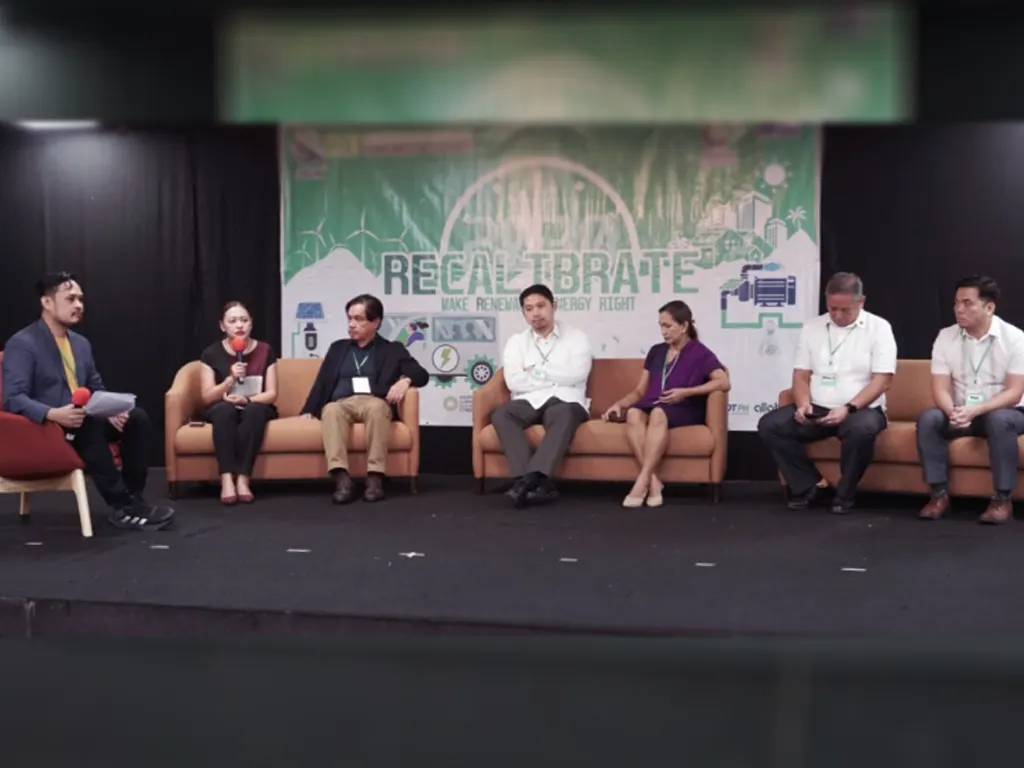
Energy Regulatory Commission Director Sharon Montañer and Napocor President Fernando Roxas tackled at the RE Congress held at the AIM Conference Center Makati on December 12, 2024 the challenges and ways forward to reach the country’s renewable energy and just energy transition goals f the country. They were joined by representatives from the International Labor Organization, Philippine Solar and Storage Energy Alliance, ICSC and CSV.
ENERGY experts, practitioners and officials, and civil society, youth, women, and workers’ groups have come together for a two-day conference in Makati City to revisit and refine strategies so that 35% of the Philippines’ power generation mix will come from renewable sources by 2030.
The Renewable Energy Congress and Exhibit, set for December 12 to 13, 2024, aims to facilitate initiatives that will make it faster and easier for the country meet its renewable energy goals.
With the theme, “REcalibrate, make Renewable Energy Right,” the event was held at the Asian Institute of Management Conference Center, 16 years since the Philippines inaugurated its Renewable Energy Law in December 2008.
The conference was organized by the Center for Empowerment, Innovation, and Training on Renewable Energy (The CENTRE) and the Friedrich-Ebert-Stiftung Philippines. The two-day Congress was graced by Senator Risa Hontiveros, a member of the Joint Congressional Energy Commission, the keynote speaker, and Ms. Athena Denise Galao, the OIC Country Programme Coordinator of UN Women, the guest speaker.
In her speech, Senator Hontiveros expressed opposition to the current natural gas bill that was approved by the Senate this month.
“The draft natural gas legislation beckons us towards a supposed bridge to a cleaner energy future,” she said.
“But this bridge is rickety, built on shaky foundations, and potentially leads us to a dead end.” She added: “Instead, let us leap forward, embracing the promise of renewable energy, and build a future that is not only sustainable, but also just and equitable for all Filipinos.”
For her part, Ms. Galao said that renewable energy is a tool to dismantle inequalities. “[Renewable energy] can transform lives, empower women, and drive economic development.
And to realize this, we need to recalibrate our efforts and embrace really bold strategic approaches that centers it on people, especially women, in the energy transition,” she said.
“It’s no coincidence that today coincides with the final day of the 18th day campaign on ending violence against women. A campaign that highlights the barriers women face not just in their personal lives, but in their access to opportunities, resources, and this includes energy.”
The Renewable Energy Congress also held two plenary meetings on day 1, which discussed and take steps to address issues and hurdle barriers that have slowed pace of clean energy adoption in the Philippines.
The first plenary meeting entitled “Re-calibrating targets, policies, and actions towards inclusive and sustainable renewable energy” featured National Power Corporation President Dr. Fernando Martin Y. Roxas and Energy Regulatory Commission Director Sharon O. Montañer, among others, as panel members.
Meanwhile, the second plenary meeting carried the theme “From vision to action: local RE policies and plans for inclusive, resilient, and sustainable energy and climate measures.”
Panelists included local government representatives such as Vincent Ferdinand Paul G. Vinarao, the Assistant Head of the Climate Change and Environmental Sustainability Department of the Quezon City government; Hon. Manuel G. Santiago II from Santiago City, Isabela; and Hon. Rolly Distura, Iloilo provincial board member who received later that day, for the local government unit, the Department of Energy’s 1st Sustainable Energy Awards.
The event also featured during a “consultation hour,” where attendees raised questions, sought suggestions, and solicited advice from practitioners and experts regarding renewable energy finance, policy, technology, and community participation. With consultation hour, conference organizers hoped to spur widespread adoption of clean energy technologies, which have been proven to provide reliable and affordable electricity across the archipelago.
These meetings and other deep dive discussions are intended to help participants further intensify their steps to help the Philippines meet its green energy goals. Based on official 2023 data, only 22% of the Philippines’ power generation mix come from renewable energy sources, still a far cry from the 35% target as previously set for 2030. With five years to go before 2030, the Renewable Energy Congress and its participants need to increase efforts so that the country will transition to a cleaner and greener future.
As early as 2008, national and local green energy policies have already been established to facilitate the transition to green energy.
Moreover, since 2020, RE plants have increased their installed capacity by 10% or an additional 800 MW. However, this has only translated to an increase of 0.7% RE share in the power generation mix, The CENTRE said.
“It is clear that achieving the 35% RE target will require expanding efforts beyond the current dominant players, engaging a wider range of stakeholders, and employing fiscal and non-fiscal tools to facilitate their participation,” Maris Cardenas, Executive Director of the CENTRE said.
She added: “The overarching goal for the existing policies and actions is energy sufficiency and climate resilience in a low carbon economy with aims to address energy poverty and security, economic recovery, and climate change.”



